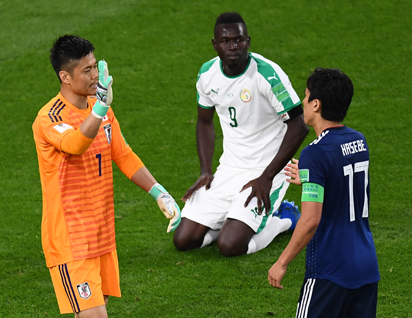
THIS year’s ongoing Federation of International Football Associations (FIFA) World Cup, which will be winding up in Russia this weekend, has lived up to the quadrennial soccer extravaganza’s reputation as a showpiece of colour, glamour, culture, global unity in diversity, competitiveness and triumphs in “the beautiful game”.
Nigeria, which competed in Group D and crashed out at the preliminary stage after winning only one game, contributed to the fiesta’s pomp and pageantry by appearing in a jersey rated as the most beautiful though our handful of supporters were massively outnumbered by other contingents in most venues.
Apart from the country that will cart home the world trophy, the Blue Samurais of Japan stole the hearts of the world with their exemplary conduct shortly after shockingly losing 2 – 3 to Belgium in their second round matchup despite establishing what had looked like an unassailable 2 – 0 lead.
The world has had its fill of strange things that happened before and after World Cup competitions. One of the most memorable was the murder back home in Colombia by a trigger-happy aggrieved fan of a Colombian talented defender, Andres Escobar Saldarriaga, who mistakenly scored an own goal at the 1994 World Cup held in the United States.
In the 1962 edition, Italian journalists described the host, Chile, as a country ravaged by “undernourishment, illiteracy and … misery”. When the two countries met on the field, the match was so violent that referee Ken Ashton said: “I wasn’t reffing a football match. I was an umpire in military manoeuvres”. In 1966, the world trophy eventually won by England was stolen before the tourney and found by a dog in a flower hedge.
But the Japanese fans shortly after losing to Belgium in Russia decided to clean up the stands by picking up trash left behind by other fans. The players cleaned up their dressing room and left a “thank you note” to the Russians in appreciation of a wonderful hosting. Japan thus showcased to the world one of the most cherished cornerstones of their national culture: consideration for others.
The cute conduct of the Japanese players and soccer fans have been approvingly celebrated across the world and we join in acknowledging and recommending it as the way to go.
We in Nigeria have a lot to learn from this “my neighbour first” public attitude of the Japanese. This is a major reason that Japan is one of the most peaceful and stable developed countries in the world despite its little available landmass and huge population of 127 million.
A little bit of Japanese chivalry will help us in Nigeria to end ethno-religious and sectional intolerance, corruption, self-centredness and total lack of regard for the common good. Thumbs up for the Japanese Blue Samurais!
END

Be the first to comment